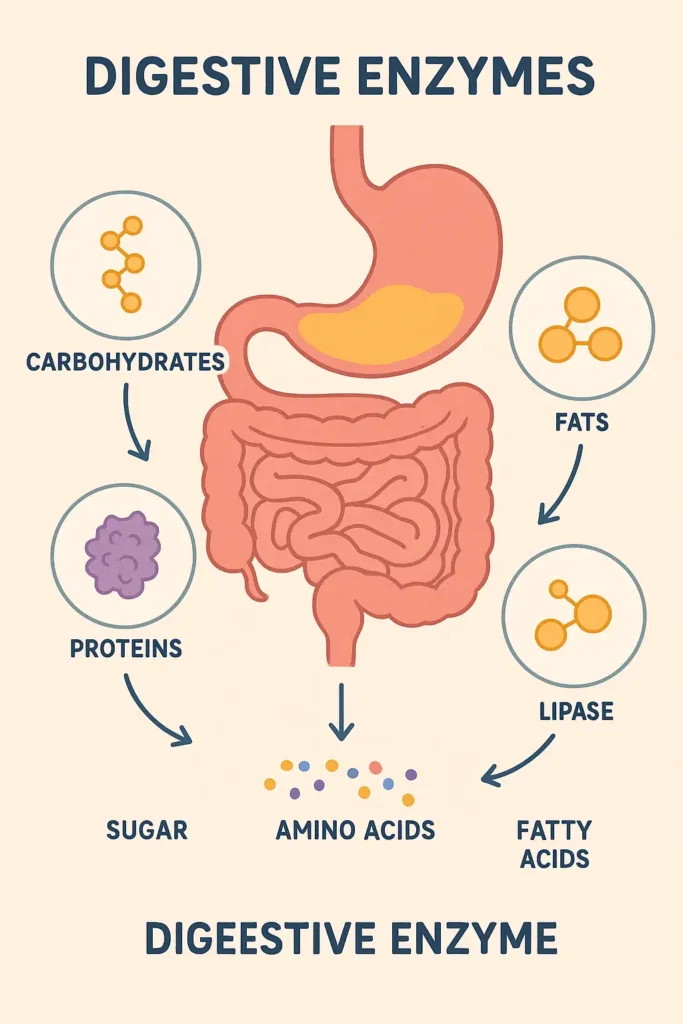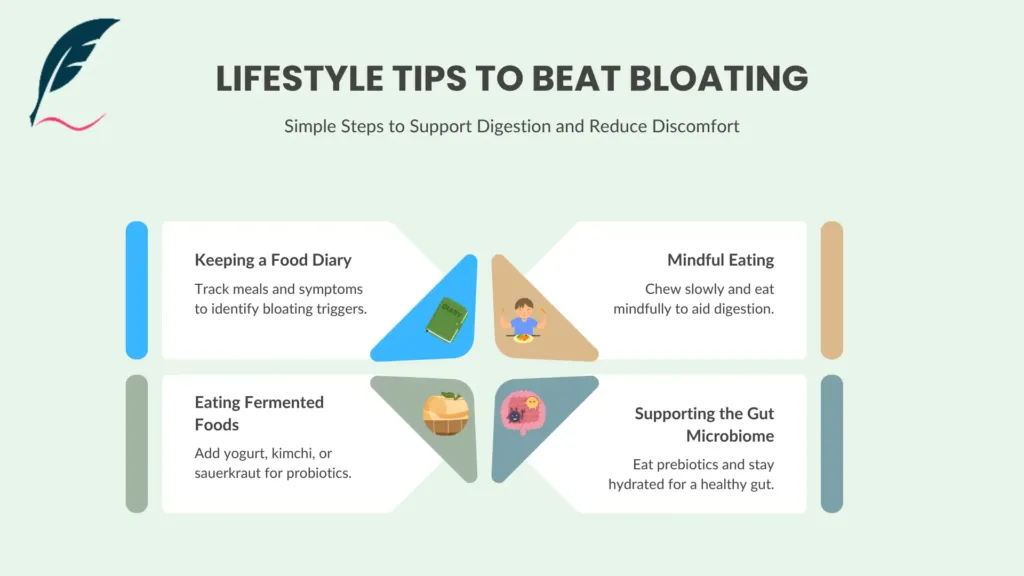Have you ever gone out to dinner with your friends and felt uneasy afterward? Your stomach feels like a balloon ready to pop, strange sounds are coming from your stomach, and it feels heavy. Rest assured, you are not alone in this matter. Many people experience bloating after eating, which can turn a good meal into an uncomfortable experience. But there is no need to panic about this problem because this bloating can be treated naturally using digestive enzymes.
In this guide, you’ll learn:
- What digestive enzymes are and how they work
- Which enzymes target specific foods
- When supplements help—and when they don’t
- Tips on choosing the best digestive enzyme supplements
By the end, you’ll have clear steps for lasting gas and bloating relief. Let’s get started and help you feel good again!
What Are Digestive Enzymes, and How Do They Work?
Digestive enzymes are a type of protein that helps break down food into smaller pieces. You can think of these enzymes as little scissors. They cut carbohydrates, proteins, and fats into simpler forms that our body can use.
Our food is not instantly converted into energy when we eat a sandwich or drink a soft drink. It has to go through several stages. Digestive enzymes play a very important role in this entire process. Our bodies make these enzymes in different places, such as our salivary glands, stomach, pancreas, and small intestine. Each enzyme has a specific job, like workers on an assembly line, each working on a different type of food.

The Specific Digestive Enzymes for Bloating with Their Targeted Uses:
The specific enzymes target specific foods that often cause bloating. Here’s a closer look:
1. Amylase
Amylase’s job is to break down carbohydrates and starch. When we chew food, these enzymes start working inside our mouths, breaking down complex carbohydrates into simple sugars, which our body can then easily absorb. These enzymes are also known as carbohydrate specialists. Lactase supplements for bloating have become incredibly popular because they allow people to enjoy dairy without the digestive consequences.
2. Alpha-galactosidase
Alpha-galactosidase is your best friend when it comes to beans, lentils, and cruciferous vegetables like broccoli and cauliflower. These foods contain complex carbohydrates called oligosaccharides that your body struggles to break down naturally. When these compounds reach your large intestine undigested, gut bacteria ferment them, causing gas and bloating. Alpha-galactosidase breaks them down before they can cause problems.
3. DPP-IV (Dipeptidyl Peptidase-IV)
DPP-IV (Dipeptidyl Peptidase-IV) helps break down gluten proteins and casein from dairy. Although it is not a cure for celiac disease, many people with mild gluten sensitivity find relief when they occasionally eat foods containing gluten using the DPP-IV enzyme blend.
4. Cellulose
Cellulose breaks down cellulose, which is found in plant cell walls. This can help digest raw vegetables and high-fiber foods that sometimes cause bloating.
5. Bromelain and papain
Bromelain and papain are natural protein-digesting enzymes found in pineapple and papaya, respectively. These natural digestive enzymes for bloating have been used for centuries to aid in protein digestion and reduce inflammation in the digestive tract.
In addition to these main ones, several specific enzymes handle specific dietary culprits.
| Enzymes | Targets | Natural Sources | Supplement Form |
|---|---|---|---|
| Lactase | Lactose (dairy sugar) | Yogurt, kefir, fermented cheese | Lactase tablets, drops |
| Alpha-galactosidase | Oligosaccharides in beans | Whole beans, legumes | Beano-style tablets |
| DPP-IV | Gluten peptides | Not in food naturally | Gluten enzyme blends |
| Cellulase | Plant fibers | Mushrooms, fermented veggies | Broad-spectrum blends |
| Bromelain | Protein in meats | Pineapple | Pineapple extract caps |
| Papain | Protein, fibers | Papaya | Papaya enzyme tablets |
Why Do We Need Digestive Enzyme Supplements?

You may ask, “If my body makes its own enzymes, why do I need supplements?” That’s a good question. Several things can reduce how many enzymes are in your body, which can lead to poor digestion and bloating.
One important reason is aging. As we grow older, the digestive enzymes in our body also weaken. This is why many people find it difficult to eat the same foods. They have eaten these foods throughout their lives without any discomfort before. The production of pancreatic enzymes decreases greatly with age.
Chronic stress also damages digestion. When you’re stressed, your body focuses energy on handling the stress instead of digesting food. This focus means less enzyme production occurs. Consequently, digestion is poor, which can lead to bloating after eating.
Long-term gut problems like irritable bowel syndrome (IBS) or inflammatory bowel disease can affect how well your body makes enzymes. Many people with these conditions find that enzyme supplements help with gas and bloating.
Eating too many processed foods can also impair enzyme function. Processed and cooked foods generally lack the natural enzymes needed for digestion. In addition, too much sugar and refined carbohydrates can upset the balance of good bacteria in your gut, which is important for digestion.
Some medications, such as proton pump inhibitors (PPIs) for acid reflux, can reduce stomach acid production. Many digestive enzymes need stomach acid to trigger, so this can lead to more digestive problems.
When the body doesn’t make enough enzymes, food isn’t broken down properly. The undigested food then moves into the large intestine, where bacteria ferment it, causing gas, bloating, and discomfort. This is where enzyme supplements can help, providing the enzymes your body needs for better digestion.
Finding Your Perfect Match: Which Enzymes Relieve Your Bloating?
The right enzyme supplement depends on the cause of your bloating. Below, we break down solutions for common triggers, as shown in the table below.
| Bloating Cause | Enzyme Solution | Key Notes |
|---|---|---|
| Dairy (Lactose Intolerance) | Lactase | Take before dairy; look for high lactase units. |
| Beans & Gassy Vegetables | Alpha-galactosidase (e.g., Beano) | Breaks down oligosaccharides to reduce gas. |
| Gluten & Complex Proteins | DPP-IV | Not for celiac disease; helps with minor gluten sensitivity. |
| Heavy Meals | Broad-spectrum blends (Amylase, Protease, Lipase) | Supports digestion of carbs, proteins, and fats. |
1. For Dairy Bloating (Lactose Intolerance)
- Solution: Lactase supplements
- Tip: Take lactase before eating dairy products. Look for supplements with enough lactase activity units (ALU) to ensure effectiveness. For example, Lactaid Fast Act is a popular choice for lactose intolerance.
2. For Beans and Gassy Vegetables
- Solution: Alpha-galactosidase (e.g., Beano)
- Explanation: This enzyme breaks down oligosaccharides. These are complex sugars found in legumes and cruciferous vegetables. Humans can’t naturally digest them. By breaking down these sugars, the enzyme reduces gas production.
3. For Gluten and Complex Proteins
- Solution: DPP-IV enzyme blends
- Note: These are not suitable for celiac disease but may help people with mild gluten sensitivity by helping with gluten intolerance. Always consult a doctor for gluten-related issues.
4. For General Discomfort from Heavy Meals
- Solution: Broad-spectrum enzyme blends including amylase, protease, and lipase
- Benefits: They provide comprehensive support for digesting mixed foods, making them ideal for bloating caused by rich or heavy meals.
When Digestive Enzymes Might Not Work
While digestive enzyme supplements may help some people, they are not a universal solution. According to Harvard Health, there is limited evidence that these supplements relieve bloating, gas, or bowel irregularity for most people. They may be prescribed for conditions like pancreatic insufficiency, but for the general population, the benefits are not well established.
Medical News Today notes that while small studies suggest that enzymes may reduce bloating in conditions like lactose intolerance or IBS, more research is still needed to confirm their effectiveness on a larger scale. Here are some conditions where enzymes may not help:
- Normal Digestion: If your body produces enough enzymes, supplements may offer no additional benefit.
- Overreliance: Relying solely on supplements without addressing diet or lifestyle may not resolve bloating long-term.
- Misdiagnosed Issues: Bloating caused by food allergies, infections, or other conditions may not respond to enzymes.
Consult a healthcare provider to rule out underlying issues before starting supplements.
Natural Lifestyle Tips to Reduce Bloating
Digestive enzyme supplements can be very helpful, but using them along with natural lifestyle changes is the best way to get long-term relief from bloating.
- Keep a Food Diary: Track your meals and symptoms to identify trigger foods. For example, dairy or beans may be culprits.
- Mindful Eating: Chew thoroughly and eat slowly to aid mechanical digestion and mix food with salivary enzymes.
- Include Fermented Foods: Yogurt, kefir, sauerkraut, and kimchi contain probiotics that support a healthy gut microbiome.
- Support Your Gut Microbiome: Eat prebiotic foods like garlic, onions, and bananas, and stay hydrated to promote smooth digestion.
These habits, as shown in the infographic below, can complement or even reduce the need for supplements.

Best Digestive Enzyme Supplements
Here are three top-rated digestive enzyme supplements to consider, each with specific use cases:
1. NOW Super Enzymes
This supplement has strong enzymes and betaine HCl, which helps with stomach acid. It is especially helpful for people who think they have low stomach acid and a lack of enzymes. The betaine HCl helps turn on the enzymes and aids in better protein digestion.
Best for: Protein digestion issues, age-related enzyme decline, and people with low stomach acid
🛒 Check Latest Price of NOW Super Enzymes
2. Lactaid Fast Act
These tablets are the best choice for lactose intolerance. Each pill has 9,000 lactase units. They work fast to stop bloating and discomfort from dairy.
Best for: Lactose intolerance and dairy-related bloating
3. Life Extension Enhanced Super Digestive Enzymes & Probiotics
Vegetarian-friendly, non-GMO, and includes both enzymes and probiotics to support GI balance and nutrient absorption. Ideal for plant-based diets.
Best For: Complete digestive and gut health support.
🛒 View Life Extension Enzymes & Probiotics on Amazon
Disclaimer:
Always talk to your doctor before taking any supplements, especially if you have health problems, are on medicine, or are pregnant or breastfeeding. Results can be different for each person, and something that helps one person might not help another.
Frequently Asked Questions
Enzymes usually begin to work 15–30 minutes after you take them with food, helping to break down nutrients while you digest.
Side effects are uncommon but can include feeling sick, cramps, or allergic reactions if used too much. Follow the dosage instructions and talk to a doctor if you’re worried.
For short-term problems, you can use enzymes when needed. For long-term issues, talk to a doctor to see if it’s safe to use them regularly.
Not always. Some people use enzymes for a short time to fix digestion problems. Others, like those who cannot digest lactose or who lose enzymes as they age, might need to use them for a longer time. The aim is to help your body digest food better while fixing any main reasons for poor digestion.
Some digestive enzymes are safe for kids, but you should always talk to a doctor about the right dose and products. For example, lactase supplements are often used for kids who have trouble with lactose.
Digestive enzymes can help with digestion and make you feel less bloated, but they are not weight loss pills. Better digestion can help your body take in nutrients and lower cravings from poor digestion, but the enzymes alone do not lead to weight loss.
Smart Digestion Starts with Smart Choices
Digestive enzymes help reduce bloating and make eating more enjoyable. They break down hard-to-digest foods so your body can absorb them better and avoid gas. Identify the foods that bother you. These may include dairy, beans, gluten, or heavy meals. Use the right enzyme for each of them. Lactase is for dairy, alpha-galactosidase is for beans, and DPP-IV is for gluten. Consider a combination for other foods.
Taking enzyme supplements carefully, drinking plenty of water, and choosing good foods can help you feel better in the long run. Always talk to your doctor before starting any new supplement, especially if your symptoms persist. With the right choices and enzymes, you can improve your digestion and feel less bloated.




